This area offers access to training materials, certification programs, and guidelines essential for maintaining high standards in coaching and officiating within the sport. By utilizing these resources, coaches and officials can enhance their skills, stay informed about the latest developments, and contribute to the growth and integrity of MMA.
Certified MMA Coaches are professionals who have undergone rigorous training and assessment to ensure they possess the knowledge, skills, and expertise to train fighters effectively and safely. Their certification guarantees that they meet high industry standards and contribute to the development and success of their athletes.
1.Certification Process:
•Coaches complete recognized training programs offered by reputable MMA organizations or governing bodies.
•Certification involves theoretical exams, practical demonstrations, and ongoing assessments.
2.Knowledge Base:
•Technical Skills: Proficiency in various martial arts disciplines like boxing, jiu-jitsu, wrestling, Muay Thai, and more.
•Fight Strategy: Expertise in planning and executing fight strategies tailored to an athlete’s strengths and weaknesses.
•Injury Prevention: Comprehensive knowledge of safe training practices to minimize risks.
•Nutrition and Fitness: Understanding the dietary and physical conditioning requirements for fighters.
3.Responsibilities:
•Training: Preparing fighters for competitions through structured drills and techniques.
•Mentoring: Providing emotional and mental guidance to foster discipline and sportsmanship.
•Compliance: Ensuring adherence to rules and regulations set by MMA governing bodies.
4.Benefits of Certification:
•Validates the coach’s professionalism and expertise.
•Opens opportunities to train fighters for high-level competitions.
•Enhances the safety and ethical standards of MMA.
5.Continuing Education:
•Certified coaches are encouraged to attend workshops, seminars, and refresher courses to maintain and upgrade their credentials.
•Staying current with the latest advancements in MMA ensures continued success and adherence to best practices.
Certified coaches play a pivotal role in ensuring fighters’ preparedness, safety, and overall performance, maintaining the sport’s integrity and professional standards.
The coaching system in Mixed Martial Arts (MMA) is structured to ensure that fighters receive comprehensive training and support to develop their skills, improve performance, and maintain safety. It encompasses various roles, methodologies, and collaborative efforts between coaches, athletes, and support staff.
1. Specialized Coaching Roles
•Head Coach: Oversees the fighter’s overall training plan, strategy, and development.
•Striking Coach: Focuses on disciplines like boxing, kickboxing, and Muay Thai.
•Grappling Coach: Teaches wrestling, Brazilian jiu-jitsu, and judo techniques.
•Strength and Conditioning Coach: Improves the fighter’s physical fitness, endurance, and strength.
•Mental Performance Coach: Enhances mental toughness, focus, and psychological preparation.
•Cutman: Manages injury prevention and quick treatment during competitions, like dealing with cuts and swelling.
2. Phases of Training
•Focuses on general skill improvement, strength building, and conditioning.
•An 8–12-week period before a fight where the focus is on peak performance.
•Includes tailored game plans for the opponent, sparring, and weight management.
•Post-Fight Recovery:
•Time for healing, analyzing performance, and setting goals for future growth.
3. Core Elements of Training
•Technical Training: Improving specific martial arts techniques across multiple disciplines.
•Tactical Training: Developing fight strategies and adapting to opponents.
•Physical Conditioning: Ensuring optimal fitness, strength, and agility.
•Mental Conditioning: Building confidence, focus, and resilience under pressure.
•Diet and Weight Management: Maintaining a healthy diet and cutting weight safely for fights.
•Coaches work closely with nutritionists, medical professionals, and physiotherapists to ensure holistic care for the athlete.
•Effective communication among the team ensures that the fighter’s training aligns with their health and performance needs.
5. Certification and Accreditation
•Many organizations require coaches to have certifications to maintain high standards in coaching and fighter safety.
•Certified coaches are trained in injury prevention, athlete welfare, and ethical practices.
6. Individualized Approach
•Each fighter’s training plan is tailored based on their strengths, weaknesses, and goals.
•Flexibility allows adaptation to the athlete’s learning pace and competitive needs.
The MMA coaching system emphasizes teamwork, expertise, and adaptability, providing fighters with the tools they need to succeed while prioritizing their well-being and long-term development.
